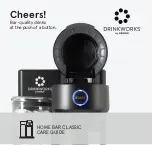
Section 5. System Overview
5.3.12.2 Protection from Voltage Transients
Read More
See
Grounding
(p. 105).
The CR1000 must be grounded to minimize the risk of damage by voltage
transients associated with power surges and lightning-induced transients. Earth
grounding is required to form a complete circuit for voltage-clamping devices
internal to the CR1000. Refer to the appendix
Transient-Voltage Suppressors List
(p. 648)
for information on available surge-protection devices.
5.3.12.3 Factory Calibration
Related Topics
•
Auto Calibration — Overview
(p. 92)
•
Auto Calibration — Details
(p. 344)
•
Auto-Calibration — Errors
(p. 490)
•
Offset Voltage Compensation
(p. 323)
•
Factory Calibration
(p. 94)
•
Factory Calibration or Repair Procedure
(p. 476)
The CR1000 uses an internal voltage reference to routinely calibrate itself.
Campbell Scientific recommends factory recalibration every two years. If
calibration services are required, refer to the section entitled
Assistance
(p. 5)
at the
front of this manual.
5.3.12.4 Internal Battery — Details
Related Topics:
•
Internal Battery — Quickstart
(p. 45)
•
Internal Battery — Details
(p. 94)
Warning
Misuse or improper installation of the internal lithium battery can
cause severe injury. Fire, explosion, and severe burns can result. Do not recharge,
disassemble, heat above 100 °C (212 °F), solder directly to the cell, incinerate, or
expose contents to water. Dispose of spent lithium batteries properly.
The CR1000 contains a lithium battery that operates the clock and SRAM when
the CR1000 is not externally powered. In a CR1000 stored at room temperature,
the lithium battery should last approximately three years (less at temperature
extremes). If the CR1000 is continuously powered, the lithium cell should last
much longer. Internal lithium battery voltage can be monitored from the CR1000
Status
table. Operating range of the battery is approximately 2.7 to 3.6 Vdc.
Replace the battery as directed in
Replacing the Internal Battery
(p. 473)
when the
voltage is below 2.7 Vdc.
The lithium battery is not rechargeable. Its design is one of the safest available
and uses lithium thionyl chloride technology. Maximum discharge current is
limited to a few mA. It is protected from discharging excessive current to the
internal circuits (there is no direct path outside) with a 100 ohm resistor. The
design is UL listed. See:
http://www.tadiran-batterie.de/download/eng/LBR06Eng.pdf.
94
Summary of Contents for CR1000
Page 2: ......
Page 4: ......
Page 6: ......
Page 32: ......
Page 36: ......
Page 38: ......
Page 40: ......
Page 60: ...Section 4 System Quickstart Figure 16 PC200W View Line Graph 60 ...
Page 96: ......
Page 98: ...98 ...
Page 302: ......
Page 453: ...Section 8 Operation Figure 115 Using the Keyboard Display 453 ...
Page 456: ...Section 8 Operation Figure 118 Real Time Custom 456 ...
Page 457: ...Section 8 Operation 8 8 1 3 Final Memory Tables Figure 119 Final Memory Tables 457 ...
Page 458: ...Section 8 Operation 8 8 2 Run Stop Program Figure 120 Run Stop Program 458 ...
Page 460: ...Section 8 Operation Figure 122 File Edit 460 ...
Page 461: ...Section 8 Operation 8 8 4 PCCard Memory Card Display Figure 123 PCCard CF Card Display 461 ...
Page 478: ......
Page 506: ......
Page 536: ......
Page 636: ......
Page 642: ......
Page 644: ......
Page 676: ......
Page 677: ......
















































